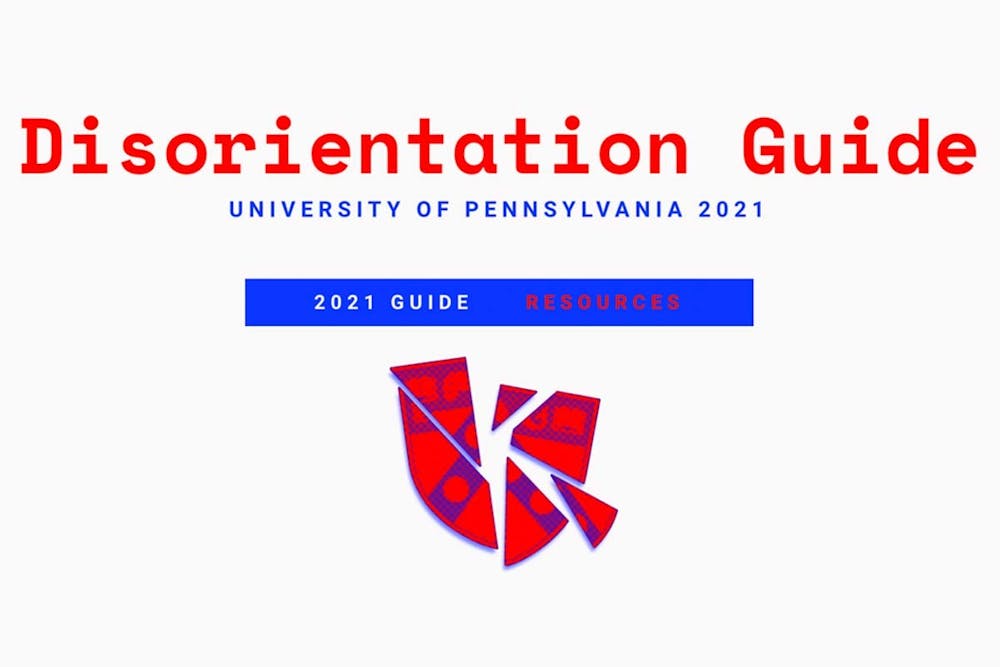
This year's version of the Disorientation Guide included a new article focusing on the University’s early response to the COVID-19 pandemic. (Artwork from www.penndisorientation.wordpress.com)
As new students arrived on campus for the fall semester, student activists supplied them with a "disorientation guide" that discusses topics that are left out of new student programming.
The 2021 Disorientation Guide, which was compiled by a coalition of student activist groups called the "People's Board," consists of articles about Penn's impact on students, staff, Philadelphia, and the world. The entirely digital guide also includes a list of next steps that community members can take to address any harm that the University has caused.
“Penn works very hard to present a favorable picture of itself and its engagement with the surrounding community," the Welcome Letter states. "This guide attempts to present a more honest picture of our school."
The articles are split into two categories — “Penn’s Impact on Philadelphia and the World” and “Penn’s Impact on Its Students and Staff." They cover topics including campus policing, Penn’s handling of the MOVE bombing remains, and the University's investments in the fossil fuel industry.
While many of the articles in this year's guide are similar to ones written in previous years, the 2021 guide included a new article focusing specifically on the University’s early response to the COVID-19 pandemic, including its decision to lay off 140 Bon Appétit workers and close on-campus housing with limited notice, giving students little time to find new accommodations.
Each article within the guide is published without students' names, attributing credit only to the student organizations fighting against the issue. People’s Board member and College senior Claire Medina said it's intentional.
“We, as a coalition of the People’s Board, and all direct action groups on campus, believe that what happened is more important than who gets credited,” Medina said. “We're only here for four years. The most important thing is that the information is available there.”
By publishing all articles anonymously, all organizers are taking the same amount of risk, giving all community members the opportunity to write, regardless of background, College junior Andrés Gonzalez-Bonillas said.
“Historically, universities try their best to punish campus organizers, be that through academic probation or financial aid,” Gonzalez-Bonillas, who is a member of Police Free Penn, said. “We're trying our best to make sure that we all stay safe.”
Many of the organizations and causes represented in the guide have been advocating for the same changes for years. College sophomore Megha Neelapu, a member of Fossil Free Penn, said some organizations, including Fossil Free Penn also published articles that are nearly identical to articles in last year’s guide.
“I don't think it's that our goal can't be done in a year,” Neelapu said. “I think it's very doable to be done in a year — it's just that Penn as an institution is extremely resistant to change.”
Gonzalez-Bonillas said that students must continue to address the issues they care about “again, and again, and again” until the University does something.
“If every four years, you get a class and when people graduate and move on, they are no longer there to do the work, that's totally fine. That's not on them. But the University takes advantage of that,” Gonzalez-Bonillas said.
Though the guide is available for anyone to read, much of its intent is to introduce first-year students to Penn’s impact on its own community and the larger Philadelphia community, Gonzalez-Bonillas said.
The guide was published online only, as it was in 2020, for health and environmental reasons. In previous years, organizers handed new students physical copies following the in-person Convocation ceremony.
College first year Mariam Jusabani said that as an international student from Tanzania, she did not have a lot of information about the culture of the United States and Philadelphia before coming to Penn. Jusabani said she was glad the disorientation guide was able to inform her about certain issues early on in her Penn career so she could begin to address them.
Jusabani said she was especially interested in the article titled “Why Can’t Penn Talk About Israel.”
“I thought it was interesting and important to see the article about Palestine because I have a friend here from Palestine, and that article helps me understand what she is going through,” Jusabani said.
“Every single person, every year, should read this orientation guide," Gonzalez-Bonillas said. "Every time I meet someone new and they haven’t read it, I give them the link. It’s one of the most important things you can do as a Penn student."
The Daily Pennsylvanian is an independent, student-run newspaper. Please consider making a donation to support the coverage that shapes the University. Your generosity ensures a future of strong journalism at Penn.
Donate






